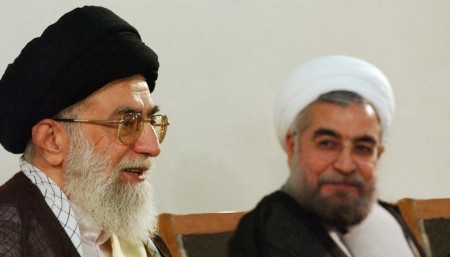News from Iran continues to be led by the Syrian regime’s response to Wednesday’s chemical weapons attacks in Syria that killed at least 1,360 people.
And that news indicates Tehran may now be divided over its approach.
While Tehran has taken up the position — like Russia — that UN inspectors must be allowed to visit the sites of the attacks, high-level officials vary in their statements on whether insurgents must be responsible.
President Rouhani, in his first comment on the events, refrained from casting blame, “Many of the innocent people of Syria have been injured and martyred by chemical agents and this is unfortunate. We completely and strongly condemn the use of chemical weapons.”
Rouhani’s official Persian-language Twitter account also carried the same comments:
#روحانی از اوضاع منطقه به شدت متاسفم شرايطي كه امروز در سوريه حاكم شده است و بسياري از مردم بيگناه، آن هم توسط سلاح هاي شيميايي شهيد شده اند
— دکتر حسن روحانی (@Rouhani_ir) August 24, 2013
#روحانی کاربرد سلاح شیمیایی در سوریه را کاملاً و قویاً محکوم می کنیم.
— دکتر حسن روحانی (@Rouhani_ir) August 24, 2013
In the interview with Iranian media, Rouhani condemned the West and Israel for destabilizing the Middle East, but he preferred to focus on last week’s bombings in Lebanon rather than the Syrian conflict.
In contrast, Foreign Minister Mohammad Javad Zarif is maintaining his line — taken from Damascus — that insurgents deliberately attacked civilians in the Damascus suburbs.
See Iran Analysis: Tehran’s Syria Propaganda — “Terrorists and Takfiris” Using Chemical Weapons
According to Press TV, “condemned any use of chemical weapons by terrorist groups” in a phone call with Syrian counterpart Walid al-Muallem on Saturday.
In a telephone conversation with Italian Foreign Minister Emma Bonino, Zarif declared, “The international community must show a serious reaction to the use of chemical weapons by the terrorists in Syria and condemn this move.”
We noted on Friday that Zarif’s tougher line — and that of his deputies — is likely handed down from the Supreme Leader’s office. That raised the question of whether Rouhani’s policy of “engagement” with the West and the US “will be undone by the unflinching Iranian line behind President Assad”.
That analysis is reinforced this morning by Fars News’ presentation of Rouhani’s interview. Fars, which is close to the Revolutionary Guards, twists the words of the President by referring to “terrorists” in the headline, “Iranian President Strongly Condemns Terrorists’ Use of Chemical Weapons in Syria“.
Of course, the division may not be that wide. Rouhani and Zarif may be playing “good cop, bad cop”. The President may be holding a more measured diplomatic position, while agreeing with blaming insurgents for the chemical attack .
There is an alternate explanation, however. Rouhani, with decades of experience, is a shrewd politician on the domestic and international fronts. He may recognize that Iran is over-extended in its blame, given the abundance of evidence that the regime carried out Wednesday’s assault and did so with toxic agents — and that the claims of Syrian State media, backed by Russian outlets, verge on the nonsensical.
In that case, the President is giving himself a way out if the line of “insurgents did it” cannot be held.
The test for Tehran may thus be its call for the Assad regime to allow at least a token visit by UN inspectors to the attack sites. If Damascus refuses, then Tehran will shift away from an approach which solely targets the opposition.
Still the question: will the Supreme Leader accept this?

